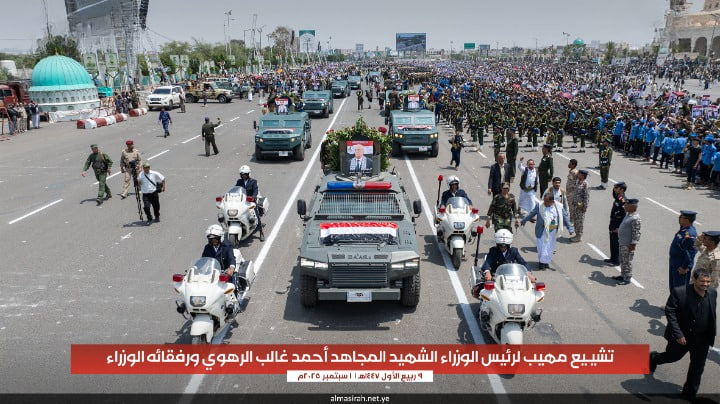Sana’a Bids Farewell to Its Leaders on the Road to Jerusalem… The Blood of Yemen’s Ministers Shapes a New Equation in the Nation’s Struggle
In a scene unseen in Arab capitals for decades, steadfast Sana’a became a surging sea of people as crowds gathered in Al-Sab‘een Square to mourn the Prime Minister of the Change and Reconstruction government, Mujahid Ahmad Ghalib Al-Rahwi, and his fellow ministers—who were martyred in a treacherous Zionist strike.
The funeral was not merely a farewell to those who fell; it was a historic event on the scale of a nation and a thunderous message that Yemen—its leadership and people—now stands at the forefront of the great struggle, and that its sacrifices are writing a new chapter in the record of Arab and Islamic liberation.
A Martyrdom on the Scale of a State
When a prime minister and a retinue of his ministers are martyred in the heart of the capital, the scene transcends Yemen alone; it is an event that reshapes the balance of the conflict. Authority steps down from its seats to the fields of sacrifice, declaring that responsibility is not a title or a chair but blood poured on the road to Jerusalem.
Al-Rahwi and his colleagues were martyred while convening a governmental performance-review workshop—where the ink of policy mixed with the blood of martyrdom, and the session shifted from evaluating plans to writing history.
From Al-Sab‘een to Jerusalem
Processions moved from Al-Sha‘b Mosque toward Al-Sab‘een Square—the same square that once embraced the funeral of the martyred President Saleh Al-Samad—where another group of Yemeni leaders was laid to rest today, in an image that compresses a continuing march: hands that protect, hands that build, then ascend as martyrs.
The flags draped over the coffins and the cries of the crowds that shook the capital affirmed that the leaders’ blood is not an end but fuel for a new phase—one that maps the road to Jerusalem first with the blood of statesmen, then with the blood of soldiers.
A Stance the Size of a Nation
Acting Prime Minister Sheikh Muhammad Miftah declared that Yemen faces today an entire system of arrogance, from Washington to Tel Aviv and their allied Arab collaborators, and stated plainly: we do not regret these sacrifices; we are honored by them, and we will continue on this path until victory is achieved.
Meanwhile, the Grand Mufti of Yemen, Sheikh Shamsuddin Sharaf al-Din, stressed that the martyrs “kept their covenant with God,” and that their blood will remain a cry for justice against the Zionist project of domination. He called for national unity and steadfastness and urged the reporting of anyone who conspires with the enemy, asserting that this struggle is not a mere political skirmish but a fight for existence and destiny.
A Faithful Epic That Transcends Geography
The turnout was not limited to the capital’s residents; delegations arrived from northern and southern governorates—an uncommon national tableau demonstrating that Yemen, despite its wounds, is one body confronting the enemy. The square, filled with takbirs and chants, resembled a popular referendum in favor of resistance.
The scene proclaimed that Yemen has offered its government as a sacrifice for the nation, and that these sacrifices are not local in scope but part of Palestine’s struggle. The chants, mingled with tears, bridged Sana’a and Gaza, channeling blood toward a single destination: Jerusalem.
Yemen Makes New History
At a time when some Arab regimes have chosen platforms of normalization, Yemen presented a counterimage: a government targeted because it stands at the heart of the nation’s struggle and a people burying it as if burying part of their own body.
This is not a defeat, as the Leader Abdul-Malik Badr al-Din al-Houthi described it, but “an honorable stance” that records Yemen’s refusal to remain in rhetoric alone; it places the blood of its leaders in the scales of battle.
The Martyrs’ Blood Waters the Path to Victory
Though the coffins departed from Al-Samad Garden, the crowds did not abandon their spirit. It was evident that this blood will turn into a doctrine of vengeance, and that the armed forces—today striking Israeli ships—will not cease until the martyrs’ blood yields victory and dignity.
Sana’a told the world: we occupy the holiest stance. A government cadre rose on the road to Jerusalem, and a people who will not bargain, concede, or retreat.

